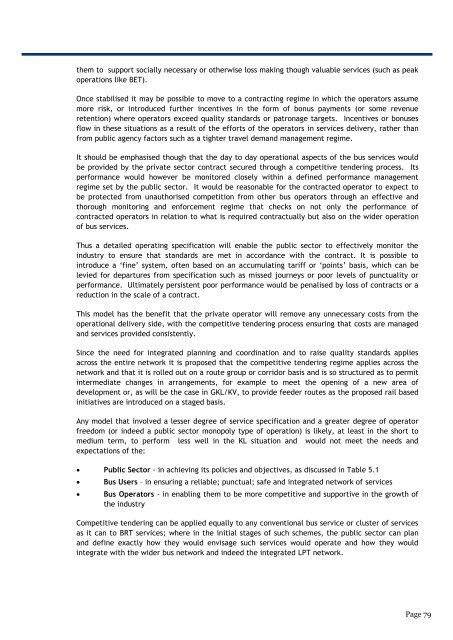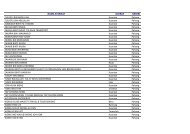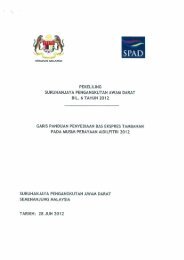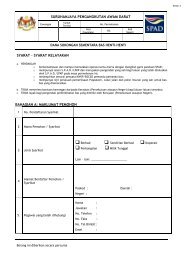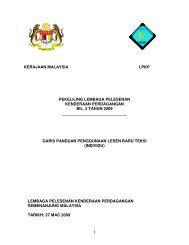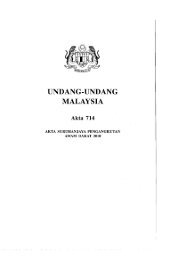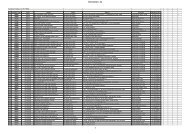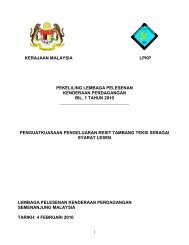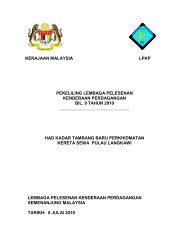Contents - SPAD
Contents - SPAD
Contents - SPAD
You also want an ePaper? Increase the reach of your titles
YUMPU automatically turns print PDFs into web optimized ePapers that Google loves.
them to support socially necessary or otherwise loss making though valuable services (such as peak<br />
operations like BET).<br />
Once stabilised it may be possible to move to a contracting regime in which the operators assume<br />
more risk, or introduced further incentives in the form of bonus payments (or some revenue<br />
retention) where operators exceed quality standards or patronage targets. Incentives or bonuses<br />
flow in these situations as a result of the efforts of the operators in services delivery, rather than<br />
from public agency factors such as a tighter travel demand management regime.<br />
It should be emphasised though that the day to day operational aspects of the bus services would<br />
be provided by the private sector contract secured through a competitive tendering process. Its<br />
performance would however be monitored closely within a defined performance management<br />
regime set by the public sector. It would be reasonable for the contracted operator to expect to<br />
be protected from unauthorised competition from other bus operators through an effective and<br />
thorough monitoring and enforcement regime that checks on not only the performance of<br />
contracted operators in relation to what is required contractually but also on the wider operation<br />
of bus services.<br />
Thus a detailed operating specification will enable the public sector to effectively monitor the<br />
industry to ensure that standards are met in accordance with the contract. It is possible to<br />
introduce a „fine‟ system, often based on an accumulating tariff or „points‟ basis, which can be<br />
levied for departures from specification such as missed journeys or poor levels of punctuality or<br />
performance. Ultimately persistent poor performance would be penalised by loss of contracts or a<br />
reduction in the scale of a contract.<br />
This model has the benefit that the private operator will remove any unnecessary costs from the<br />
operational delivery side, with the competitive tendering process ensuring that costs are managed<br />
and services provided consistently.<br />
Since the need for integrated planning and coordination and to raise quality standards applies<br />
across the entire network it is proposed that the competitive tendering regime applies across the<br />
network and that it is rolled out on a route group or corridor basis and is so structured as to permit<br />
intermediate changes in arrangements, for example to meet the opening of a new area of<br />
development or, as will be the case in GKL/KV, to provide feeder routes as the proposed rail based<br />
initiatives are introduced on a staged basis.<br />
Any model that involved a lesser degree of service specification and a greater degree of operator<br />
freedom (or indeed a public sector monopoly type of operation) is likely, at least in the short to<br />
medium term, to perform less well in the KL situation and would not meet the needs and<br />
expectations of the:<br />
Public Sector - in achieving its policies and objectives, as discussed in Table 5.1<br />
<br />
<br />
Bus Users – in ensuring a reliable; punctual; safe and integrated network of services<br />
Bus Operators - in enabling them to be more competitive and supportive in the growth of<br />
the industry<br />
Competitive tendering can be applied equally to any conventional bus service or cluster of services<br />
as it can to BRT services; where in the initial stages of such schemes, the public sector can plan<br />
and define exactly how they would envisage such services would operate and how they would<br />
integrate with the wider bus network and indeed the integrated LPT network.<br />
Page 79


